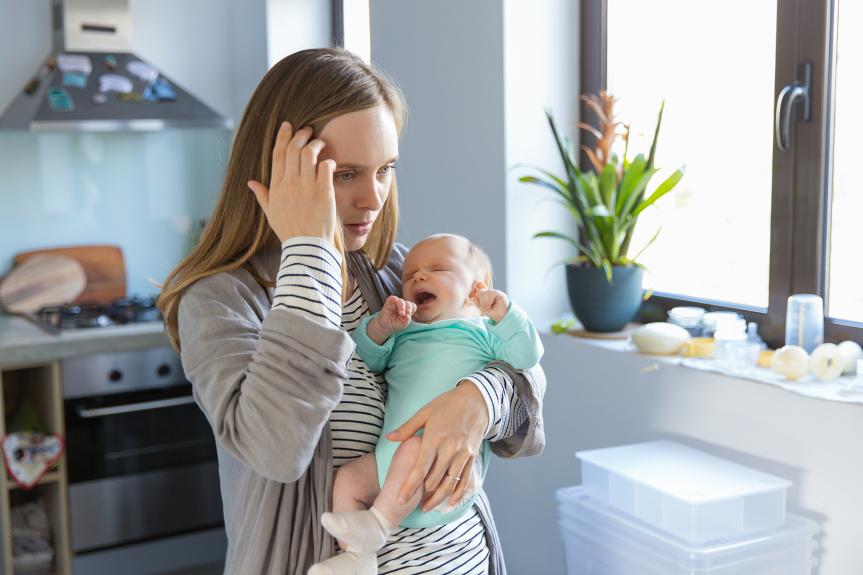Women's Mental Health transitions to virtual and creates new connections
It’s not easy being a new mom. You’re thrust into a world where sleep deprivation and uncertainty become the status quo. It’s difficult in any environment, but especially challenging during a global pandemic.
In 2020, nearly 375,000 women in Canada gave birth. In 2019, it was reported that 23 percent of mothers experienced some level of a mood and/or anxiety disorder during the perinatal period. According to a study conducted by the University of Calgary, 37 percent of women pregnant during the pandemic reported clinically elevated symptoms of depression and 56 percent reported moderately to severely elevated anxiety symptoms. The research shows that women in this vulnerable category need connection, community and support to weather the complexity of mothering alone.
Over the course of the pandemic, Women’s Mental Health at The Royal became a lifeline to new moms. “In our perinatal groups, we’re hearing that new moms are experiencing anxiety and depression. That they’re bored and lonely, struggling to navigate boundaries with family and friends and mourning the pregnancy, birth and post-partum period that they wanted,” says Nancy McLaren Kennedy, peer specialist and mental health worker with Women’s Mental Health at The Royal.
Led by Ann-Marie O’Brien and McLaren Kennedy, alongside a passionate team of volunteers with lived expertise, Women’s Mental Health pivoted early on in the pandemic providing beloved programs like Journaling as a Wellness Tool, both general and perinatal, Healing Through Art, and general and perinatal wellness groups via Zoom.
“We’re reaching people that otherwise would have experienced physical barriers to accessing The Royal. We’re meeting the mandate virtually in a way that we couldn’t pre-pandemic,” O’Brien says. “For the mom’s group, coming to The Royal in the past, could be stigmatizing. Loading up their baby, getting on the bus or finding parking and walking in the door was a barrier in and of itself. Our peer support group members are getting all the benefit without the stigma of going to The Royal. [Our moms] can get real about mental health, because it’s a safe space.”
Women’s Mental Health serves women with serious and/or persistent mental illness and concurrent mental health issues who are receiving treatment as well those who self identify as having mental health issues. Led by women with lived and living expertise, each program at Women’s Mental Health seeks to create safe space to explore topics of mental health wellness and recovery.
“Peer support is the foundation of Women’s Mental Health. In many of our programs women have received treatment and peer support creates space to make sense of what happened. By connecting with other women who share your experience you build a community of people who normalize mental health issues, treatment, recovery and getting your life back,” says O’Brien.
The Royal has a long history of leadership in peer support. Women’s Mental Health, in particular, has had peer support since its inception. “What we bring with peer support is trust,” O’Brien says. “People have a lot of difficult experiences before they get to The Royal and when they’re here they receive world-class treatment. And, that goes for peer support as well. For women, it is really important. When we come together our experience stops being exceptional and becomes the norm.”
By connecting with other women who share your experience you build a community of people who normalize mental health issues, treatment, recovery and getting your life back. – Ann-Marie O'Brien
While taking these groups virtual has opened doors to participation across eastern Ontario, the transition to virtual wasn’t without its own challenges. At the outset of the pandemic, The Royal’s Women’s Mental Health Program was made aware that the Wellness Recovery Action Plan, or WRAP©, which is a system used to guide programming, had not been evaluated for virtual delivery.
“We recalibrated and decided that we were going to bring women together to talk about recovery based on what we know to be true,” O’Brien said.
McLaren Kennedy turned to the programming approaches that had worked during her time as a student in Women’s Mental Health. And, from there the ideas for connecting and engaging women blossomed.
“One of our partners came up with the idea of hosting Facebook live events with the Ottawa Birth Centre,” McLaren Kennedy said. “Our videos have had more than 8,000 views and cover everything from nutrition to birth trauma to breastfeeding grief.”
This innovative approach added an additional layer of accessibility furthering the message of hope, personal responsibility, support and personal advocacy. Particularly for the perinatal group, these connection points have made all the difference. “Because moms can’t participate in playgroups or play dates in parks, they’re connecting through our peer support groups and using tools like WhatsApp to connect outside of the Zoom groups on everything from what to do about diaper rash to mothering in a pandemic.”
Whether it was delivering art supplies to participants’ doors for the Healing Through Art program or creating community for those struggling with the isolation of being post-partum in a pandemic, Women’s Mental Health at The Royal became a beacon of hope, a connector of women, and a safe place to heal for women across eastern Ontario.

